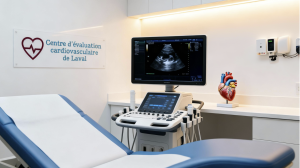The heart - that formidable, complex, tireless machine that drives our bodies from birth to the end of our days.
The importance of maintaining a healthy heart cannot be underestimated, especially in this day and age when cardiovascular disease is one of the leading causes of death worldwide.
This is where preventive cardiology comes in, an essential branch of medicine designed to keep the heart functioning properly and avoid any possible heart damage.
So what exactly does this notion of "preventive cardiology" mean?
Why might it have a significant impact on your cardiovascular health?
And most importantly, how can you actively contribute to your own cardiac well-being?
The ultimate goal is not only to have a healthy heart now, but also in the future; this is achieved not only by adopting healthy habits today, but also by carrying out regular check-ups when a risk is identified.
What is preventive cardiology?
Among the many medical branches dedicated to human well-being, preventive cardiology holds a crucial place.
This medical specialty specifically aims to anticipate and, as far as possible, avoid the onset of cardiovascular disease by identifying the risk factors that could cause these conditions.
But what does preventive cardiology really involve?
What does it involve?
To put it simply and concretely, it's essentially a set of strategies designed to keep the heart healthy over the long term.
Clearly, these are all actions taken to anticipate and slow down the development of heart or blood vessel disease.

Why is preventive cardiology important?
The answer is relatively simple; because many heart problems can be avoided with more proactive attention to cardiovascular care.
Many of the cardiac problems that arise with advanced age are often due to our past lifestyle; our unbalanced eating habits over many years have contributed without realizing it to generating these disorders, whereas many of them could have been avoided if we had adopted a healthier lifestyle over time, governed by regular physical activity combined with an adapted diet.
Who can benefit from Preventive Cardiology?
Quite simply, all of them!
No one is exempt from potentially developing cardiovascular disease at some point, so everyone could benefit from preventive cardiology.
No matter what your age or medical history...
We all stand to gain from adopting the guiding principles of this proactive form of caring.
Of course, some people will need to be particularly vigilant.
For example, if you have a family history of heart problems, or if you already suffer from a chronic disease such as hypertension (high blood pressure), it's crucial for you to seek to understand and follow the advice dictated by preventive cardiology.
These efforts are essentially necessary to adapt the patient's system to the potential repercussions they may generate, in order to avoid a potentially compromised situation in the near future and thus generate a realistic framework favorable to his or her return to a normal life.
Now that we've defined what preventive cardiology is and why it's important; let's discuss in more depth the factors that contribute to the regular heart problems encountered in clinics every day; but which few have probably considered their serious implications before this moment.
Causes and symptoms of cardiovascular disease
What cardiovascular risk factors need to be identified?
Early detection of heart disease risk relies heavily on the identification of a number of factors.
High blood pressure, smoking, high blood cholesterol and a sedentary lifestyle are among the main culprits.
People with a family history of heart disease or who suffer from diabetes themselves may also be more likely to develop these conditions.
Understanding these risks is the first step in taking action against them.
That's why, at Cardio Laval, we insist on a thorough discussion of our patients' lifestyle and medical history during their first contact with us.
Symptoms of cardiovascular disease
The warning signs are not always obvious.
Some may seem benign or even totally innocuous: shortness of breath after light exertion, swollen feet or just persistent fatigue - but they can indicate that your heart is struggling to function properly.
More classic symptoms such as chest pain or palpitations generally only appear at an advanced stage of the heart problem, so it's crucial to learn to recognize the more subtle clues so that preventive intervention can be carried out as soon as possible.
The impact of cardiovascular disease on daily life
These diseases don't just attack your heart.
They can also profoundly alter the quality of daily life.
A person whose heart is weakened by heart failure or coronary artery disease may find it difficult to perform even the most mundane tasks, such as climbing stairs.
The psychological impact should not be taken lightly either; living with a heart condition can cause anxiety and stress, leading to a vicious circle as these factors are known to worsen the heart condition.

How our Cardio Laval clinic can help
Our services in preventive cardiology
At Cardio Laval, we make every effort to ensure that you are equipped with all the tools you need to maintain your cardiovascular health.
To this end, we offer a full range of diagnostic tests - electrocardiogram at rest and under stress, echocardiography (echo-Doppler), Holter ECG monitoring - enabling us not only to accurately assess the patient's current state of health, but also his or her potential future risks.
Prevention is very important to Cardio Laval!
Our medical team works closely with you to put in place a personalized plan that will help you adapt your daily habits so that your cardiovascular system is always in the best possible shape.
Cardio Laval's personalized approach
We firmly believe that there is no one-size-fits-all approach to treating heart disease, because every patient is unique.
That's why at Cardio Laval, we personalize each and every one of our prevention and treatment plans.
When it comes to your heart health, you can't afford to settle for anything less.
We need to go beyond the simple control of conventional factors such as blood pressure or cholesterol; our approach is to take into account all the aspects that can contribute to the health of our customers. positive or negative to cardiovascular health, including emotional stress and physical activity levels.
Each course begins with a full consultation to assess your general condition (medical history, eating habits, clinical examination )It will be followed, if necessary, by a series of specialized tests designed to reveal even latent risks. Based on this solid foundation, we'll work together to build a tailored plan to ensure optimal cardiovascular health.
Take prevention one step further
The importance of a healthy lifestyle for cardiovascular health
A healthy lifestyle is a powerful tool in the prevention of cardiovascular disease.
Maintaining a balanced diet, getting regular exercise and avoiding smoking can all help to significantly reduce heart risk.
It's also essential to manage stress effectively and get enough sleep every night to allow your heart to rest.
As specialists at Cardio Laval, we understand the importance of educating our patients about the heart-healthy benefits of a healthy lifestyle, as this is often the first line of defense against cardiovascular disorders.
How can cardiovascular disease be prevented?
Preventing cardiovascular disease hinges on several key principles: maintaining a healthy body weight, adopting a balanced diet rich in fresh fruit and vegetables while limiting processed foods rich in sodium or added sugar.
In addition to encouraging regular exercise (at least 150 minutes a week of moderate activity, or 75 minutes a week if it's intense), stopping all tobacco consumption is crucial to reducing your consequent chances of developing serious cardiac problems such as myocardial infarction (heart attack) or ischemic stroke (ischemic stroke).
Cardiac ultrasound and holter insertion: invaluable tools
As dedicated practitioners at Cardio Laval, we use modern tools such as cardiac ultrasound and Holter devices to accurately observe heart function.
These practical, non-invasive procedures give doctors a complete picture of the work your heart is doing, even when you're on the move.
In this way, we are able to identify potential anomalies that may require further monitoring or treatment, depending on their severity.
Deciphering ECG results at rest and during exercise
An electrocardiogram (ECG) records the electrical activity produced by the heart as it beats.
Whether at rest or during physical effort, this offers an important clue to the current condition of your cardiovascular health.
Understanding these results is crucial to our mission at Cardio Laval - they are often our first clues to possible heart disease, which we can then identify before symptoms appear.
Now that you have a better understanding of prevention in cardiology and its significant impact on your overall health, it's time for every conscious individual to take a decisive step towards the Cardio Laval clinic!
Preserving your heart requires more than just a commitment - it's an ongoing responsibility that deserves help and advice from seasoned professionals in the field.
Prevention is the best guarantee against the tragedies often associated with cardiovascular disease.
Make an appointment now with one of us on !
We look forward to welcoming you and guiding each of you to the healthiest path possible for your heart!
So join the Cardio Laval family today and take care of yourself tomorrow!



